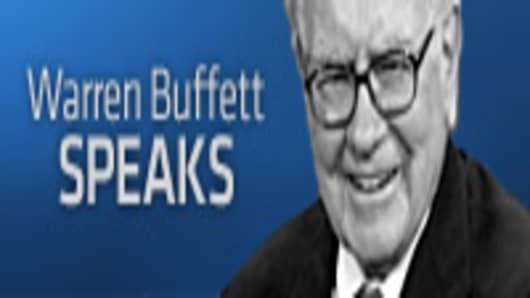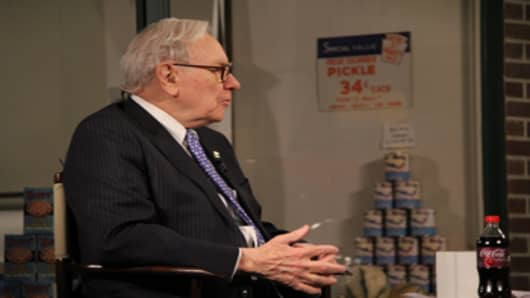BECKY: Right.
BUFFETT: They're buying them because they're using them.
BECKY: When do we see that actually play out in the jobs market? That's been the huge concern. We've got another jobs report that's coming up on Friday.
BUFFETT: Yeah. Our business at Berkshire was quite a bit better in 2010 than 2009, but we only added 3,000 jobs, you know, from 260,000 roughly, on a base. So we added 1 percent to jobs net and yet our business really improved quite a bit more than that.
BECKY: Mm-hmm.
BUFFETT: And there were real gains in productivity achieved on the downside. People, at least when they really had to tighten their belts, they found out they could do it. And I think that period is largely over. I think the gains in business will be much more reflected by gains in employment going from this point forward than they have in the first year and a half or two years of this recovery.
BECKY: Does that mean good news by the end of this year? Or does that mean good news by next year because depending on whose forecast you're watching, the employment number could go down significantly.
BUFFETT: Yeah, yeah.
BECKY: This year, or it might take two years.
BUFFETT: I'm not a—I really don't know the answer on that, but if you ask me just to guess...
BECKY: Mm-hmm.
BUFFETT: ...I would guess that that by the—by close to the election of 2012 that unemployment would be probably in the low 7s.
BECKY: OK.
BUFFETT: And then how good that'll look to people, I don't know at the time. But that would be my guess from what I see in business.
BECKY: You mentioned that the housing businesses that you have are not inching along, they're stuck. You also said, though, in your annual letter that you think housing is at a position where a year from now things might look considerably better. Tim Geithner was on the Hill yesterday. He said there's still a lot of pain to work out in housing. And you had 9400 employees that you had laid off in those businesses that cater to housing.
BUFFETT: Right.
BECKY: So when do you think it—you can actually start hiring back there?
BUFFETT: Well, we'll hire when housing starts to pick up.
BECKY: Right.
BUFFETT: And they've been now in this 550,000 a year or 600,000 range for quite a while. And they needed to be. The demand for housing comes from household formations. I mean, and household formations are running considerably higher than housing starts. So they are—the excess housing supply is being sopped up. Not at an incredible rate, but at a significant rate. And that's a counterbalance to the fact that we were building two million housing units, you know, and people were—they weren't creating two million families a year at that time. So we were—we were just building too darn many houses. And they don't go away. So the only way to solve that is to underproduce compared to household formations. And we've been doing that for a couple of years, and that's why my guess is that, in about a year, that we will have sopped up the excess supply. Now, that doesn't mean there's not all kinds of people who want to sell their house for what they paid for it five years ago.
BECKY: Mm-hmm. Right, right.
BUFFETT: But that's a whole different question. I think it's—I think it's—I know housing will pick up at some point, and it seems logical to me that it should pick up on about a year based on the—on the number of units that are getting sopped up. And it was—it's a good thing. I mean, we had that one incentive there for a while to try to move housing.
BECKY: A tax break for first-time buyers.
BUFFETT: The real thing to do is clean out the excess inventory, and the only way you clean out excess inventory, you either—you either blow up the houses or you produce fewer than households are getting formed.
BECKY: Mm-hmm.
BUFFETT: And any artificial acceleration of demand, it just means disappointment later on.
BECKY: So you didn't think the government should've made those moves?
BUFFETT: I don't think—yeah, I don't think that trying to move the fourth quarter's demand into the first quarter is a—probably not a good idea. It—we had to clean out the excess.
BECKY: You know, we're just getting to the end of a lot of government programs like that. Not only what we saw with Cash for Clunkers, with the first time hire—buyers tax credit or tax deduction that would go in. You also are getting to the point where QE2 is nearing a point where it's going to end. Now, Ben Bernanke was on Capitol Hill yesterday, too, and he did not give any indication that they'd be ending QE2 early, but it only goes through June. So what happens to the markets as, you said they're very forward looking, as they come to the recognition that the Treasury's not going to be there, or the Fed's not going to be there to prop up the Treasury market anymore.
BUFFETT: Well, I do not like—I do not like short-term bonds, and I do not like long-term bonds. And if you push me, I'm sure that I don't like intermediate-term bonds either. I just think it's a terrible mistake to buy into fixed dollar investments at these kind of rates, and I've thought so, you know, for several years now. When people ran to cash because they were afraid of everything, they were really going to the worst investment, you know, that's possible. I don't know what'll happen with Treasury markets, but we have had—I don't think people necessarily realize we've had monetary policy with its foot to the floor for a couple of years.
BECKY: Mm-hmm.
BUFFETT: And we needed that to get out of where we were. How long we need it for is another question. But the idea of overdosing the patient two years ago was a terrific idea. The patient needed every bit of morphine or whatever you put in them that they could take. We came on with fiscal policy very strong, and what people don't realize about fiscal policy, we talked about a stimulus bill a couple of years ago.
QUICK: Mm-hmm.
BUFFETT: But a stimulus bill isn't a stimulus bill because you stick the word stimulus on it. I mean, you can call any bill that spends money in Washington a stimulus bill. Stimulus is spending more money by the government than it's taking in. We are going to do that to the tune of 10 percent of GDP this year. We have massive stimulus going on in the United States. Stimulus like you haven't seen since World War II. We just don't call it a stimulus bill. But stimulus is the federal government spending way more money than it takes in, and you can call it a stimulus bill, you can— you can— you can, you know, you can call it the green flowers bill, but whatever causes the government to spend a lot more money than it's taking in is stimulus. And when you get to 10 percent of GDP you've got massive stimulus. So you've got massive monetary activity, you've got massive stimulus activity. And then what I think is the most important factor in coming out of the recession is sort of the natural regenerative capacity of capitalism. I think that's— now I think the other two can be important, and I think they're psychologically important because people expect the government to do that, and they don't— they wouldn't have confidence if the government wasn't doing it. But I think the main thing that makes the economy come back is 300 and some million people trying to figure out how to live better tomorrow than they're living today.
QUICK: That sounds like an argument for an end to this. You said— is there too much? You said we needed it then. Have we needed QE2 in some of the latest doses?
BUFFETT: Yeah. I don't— I don't think we need as much either monetary or fiscal stimulus as is going on. I think— I think we needed— the American public, the whole world needed to see two years ago that the federal government when the— when the world was going to try and deleverage and people were panicked over every kind of financial instrument, they needed to see the federal government there big time, and the government really did its job there in the fall of 2008. They threw in— they threw in everything and that was hugely important in getting across to the American people that they are— was not going to stand idly by while the whole machine came to a stop.
QUICK: Mm-hmm.
BUFFETT: But in terms of the recovery going on now, that recovery is going on because we've got 70-something managers at, you know, Berkshire trying to figure out how to do more business tomorrow than yesterday. And, you know, just look at what Apple does, or you name the company, or Amazon. They are thinking all the time of how to— how to get their customers to do more things with them.
QUICK: Let me ask you real quickly— Joe has a question, too— but I just want to pin you down on this and make sure I'm not making assumptions or putting words in your mouth. You think QE2 should end now?
BUFFETT: If I were— yeah, I have enormous respect for Ben Bernanke. He knows way— you know, he knows more about the Fed than I do by a factor of 100 to one. But in the end, I don't— I don't think we need more of that now.
TRANSCRIPT PART 2: THE 'ZEBRA' THAT GOT AWAY
Current Berkshire stock prices:
Class B:
Class A:
For more Buffett Watch updates follow alexcrippen on Twitter.
Email comments to buffettwatch@cnbc.com





